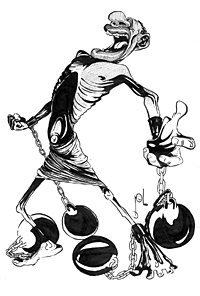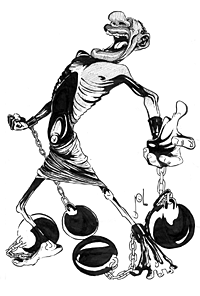
‘Akhdams’ of Taiz: Misery beyond description [Archives:2002/36/Culture]
September 2 2002
BY FAROUK AL-KAMALI
TAIZ BUREAU

The only desire of Akhdams in Taiz is to find a safe community where they can live peacefully and be treated equally as others. They have become vagabonds, an oppressed class, and above all, a deprived sector of the community of the basic needs.
It is truly a pity that no one seems to care about them. They are seen as persons of African origin, who do not have a specific home or place. They are considered as the odds and ends of the Abyssinians. They are treated on many occasions as slaves without any status or social deportment in the society.
Abduraheem Mohsen, a journalist, in one of his articles about Akhdam emphasized greatly in his articles as what he believes is the fact that Akhdam are the first people who settled in Yemen. According to him, whether they are Yemenis or Abyssinians, Akhdam are considered to be the original inhabitants of Yemen. The crux of the problem lies in the fact that they have been suffering for hundreds of years from discrimination and slavery.
Continuing this evil treatment against Akhdam is considered an ongoing crime against humanity. Akhdam are part of us and should receive all their rights as all other Yemenis. Why should they be deprived?
We know that begging is directly related to poverty and lack of sources of income. Some Akhdam tend to beg because there are no other opportunities available for them. Isolation and discrimination have prevented them from assimilating to Yemeni ways of life and at the same time prevented them from moving ahead or advancing. When you are not given a share in attaining basic education, when you are not allowed to hold public office posts or access governmental jobs, and when your only means of living is sweeping the streets and house keeping, what else will you do?
The intellectual and pro-human rights groups in the society feel sorry for this unprivileged group rather than angry. We all see them day and night toiling more than anyone else for survival. Their main jobs are resembled in street cleaning, shoe polishing, and other simple jobs. Therefore, they get very low income. The majority of them restore to begging as a means of having ends meet.
Akhdam are the only people who suffer from lack of food, live in rundown slums, and receiving little attention and care from the society. On many occasions, even the concerned authorities turn a deaf ear to their demands. It is a matter of practicing discriminatory acts against this inferior class. We in this article wonder, why are Akhdam deprived of the right to dream of a safer home and environment?
Recently, pro-human rights NGOs related to this field have been established in order to revolt against the discriminatory practices. Forty years after the revolution, Akhdam are still in deteriorating conditions and have not given due attention at all. They are still suffering from poverty, ignorance and epidemics. But the question which poses itself is: Will such NGOs succeed in their endeavors to improve the living conditions of these downtrodden masses?
Five associations have recently been established in order to fight poverty and protect Akhdam so as to integrate them into our society.
Najeeb Ashara’bi, the Chairman of the Shoemakers Handiwork Association said that the idea of establishing such associations have aimed primarily at unchaining the marginalized classes away from isolation and poverty.
Establishing such associations will serve the marginalized classes including Akhdam and other inferior classes mistreated by the public. All these associations have integrated themselves into one society called the Anti-poverty Coordination Council.
“A study in this respect has been presented to the GTZ to promote the micro-enterprises future projects including and the shoemaking project and recycling second-hand metals,” Najeeb noted further.
“We hope that these two projects would be implemented on time so as to provide fixed revenues for the poor families and also provide job opportunities for the unemployed,” he added.
Abdulghani Ali, a staff member of the Shoemakers Handiwork Association said that no rights have been granted to this class. They have no health care units and even educational facilities are not available for them.
Abdulghani demanded further the governmental bodies and human rights organizations to care for this down trodden class.
City of Hope
The first housing project named the “City of Hope” for the Akhdam has been founded by DIA. This is certainly a living example of a successful investment for the welfare of a deprived group by an international organization in Yemen. Unfortunately, the Water and Electricity Corporation has not been helpful in facilitating such projects as it has not enabled the flow of water into the houses of those downtrodden masses.
Malak al-Muntaser, a DIA staff member said that the project implemented by the DIA was for about 174 families. Those families were left homeless after torrential rains washed away their slums. “DIA is currently working in collaboration with the Human Rights Information and Training Center to promote social integration of Akhdam into the community. This aims at implementing several social activities to integrate them socially.”
Malak added “Others were surprised when I visited the houses of Akhdam, attended their marriage ceremonies and ate with them. There are misunderstood notions about this oppressed class. This should be corrected,” she added.
What is needed right now is more efforts exerted in order to integrate these classes into our societies and grant them their basic rights. The official effort is also needed to pave the way for them to be active members of the society. They should be treated as any other citizen and not be discriminated because of the color of their skin. They are part of our society that we must accept. Job opportunities should also be provided and health care services should be reachable by this class.”In conclusion, we have to work hand in hand to put an end to discriminatory treatment against those people who enrich our culture in many ways. It is about time to start to honor and respect all those minorities.
Our country will be much better if we appreciate and value the work and service those people provide instead of neglecting and ignoring their invaluable services.
We will be waiting anxiously for the day when Akhdam can feel secure and safe in their homeland Yemen. It will be the day when the concerned bodies will at least shoulder the responsibility in caring for those downtrodden masses. Such questions are in need of an immediate answer, an answer which we hope will be positive.
——
[archive-e:36-v:2002-y:2002-d:2002-09-02-p:./2002/iss36/culture.htm]


